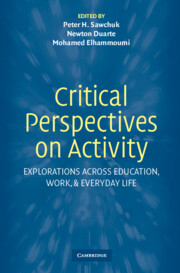1 - Introduction: Exploring Activity Across Education, Work, and Everyday Life
Published online by Cambridge University Press: 10 December 2009
Summary
INTRODUCTION
Clearly, there has been an international explosion of interest in theories of mind, culture, and activity over the last two decades. This interest is well founded. The traditions involved in this explosion speak to some of the most pressing and obvious challenges facing the social sciences. These include the increasingly inter-disciplinary nature of problem solving; the complexity of social systems; the role of technologies, tools, culture, divisions of labor, and other mediating factors; the role of cognition, social interaction, and learning; and, perhaps most importantly of all, how and why such systems – from classrooms, to schools, to organizations and beyond – undergo change. There are very few analytic traditions that offer so much to students, scholars, and perhaps even policy-makers. In this collection, theories of mind, culture, and activity are also rooted in a long and rich tradition of social criticism as well. These traditions have been recovered, developed, and expanded.
Today, there are flourishing journals, scholarly associations, conferences, and powerful research programs widely available. Reports, monographs, articles, books, and collections such as this one are circulating across international and linguistic boundaries more than ever before. However, despite this, and, in particular, despite the existence of several high-quality collections devoted to representing this explosion, there remain several important gaps that must be addressed. This collection seeks to respond to these gaps by posing, illuminating, and answering important questions that define these gaps in two principal ways.
- Type
- Chapter
- Information
- Critical Perspectives on ActivityExplorations Across Education, Work, and Everyday Life, pp. 1 - 20Publisher: Cambridge University PressPrint publication year: 2006



